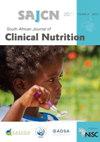南非自闭症谱系障碍儿童的饮食挑战和食物选择性
IF 0.6
Q4 NUTRITION & DIETETICS
引用次数: 5
摘要
背景:患有自闭症谱系障碍(ASD)的儿童有许多相关的喂养困难和有问题的用餐行为。这些问题会对儿童的营养摄入产生负面影响,而人们对食物偏好和食物选择的特点知之甚少。此外,对于生活在南非等中低收入国家的儿童和照料者来说,由于获得食物、资源和保健的机会有限,这些困难可能会加剧。目的:本研究的目的是确定(1)ASD儿童普遍存在的进食困难类型,(2)南非儿童喜欢的食物种类,(3)年龄和ASD严重程度对食物偏好的关系。方法:采用横断面定量研究设计,采用在线问卷。共有来自南非不同省份的40名受访者。采用描述性统计和多元线性相关分析对数据进行分析。结果:该研究确定了南非自闭症谱系障碍儿童和被诊断为挑食儿童的常见喂养困难,并将其与国际文献中发现的困难进行了比较。该研究还强调了自闭症儿童喜欢的食物类别,与水果和蔬菜相比,他们更喜欢淀粉和零食。此外,ASD严重程度与ASD年龄在食物偏好上存在显著相关性,表明年龄和严重程度可能是ASD儿童食物选择的预测因素,并强调了多学科干预的必要性。结论:本研究补充了关于自闭症儿童喂养困难的现有文献,但为生活在低收入和中等收入国家的儿童提供了额外的见解,并可用于改进适当和响应性的干预措施。本研究为支持背景和家庭环境对ASD儿童喂养的影响提供了证据。本文章由计算机程序翻译,如有差异,请以英文原文为准。
Mealtime challenges and food selectivity in children with autism spectrum disorder in South Africa
Background: Children with autism spectrum disorder (ASD) have a number of associated feeding difficulties and problematic mealtime behaviours. These problems can have a negative impact on the child’s nutritional intake and little is known about the food preferences and characteristics of food choices. In addition, these difficulties can be exacerbated for children and caregivers living in low- and middle-income countries such as South Africa due to limited access to food, resources and health care. Objectives: The purpose of this study was to determine (1) types of feeding difficulties prevalent in children with ASD, (2) food items that children in South Africa prefer, (3) the relationship between age and ASD severity on food preferences. Method: A cross-sectional quantitative research design was employed using an online questionnaire. There was a total of 40 respondents from different provinces in South Africa. The data were analysed using descriptive statistics as well as multiple linear correlation analysis. Results: The study has identified common feeding difficulties in children with ASD and those being diagnosed as picky eaters in South Africa and compared them with difficulties that were found in the international literature. The study also highlighted the food groups that were preferred by children with ASD, showing a preference for starches and snack items compared with fruits and vegetables. In addition, there were significant correlations between ASD severity and ASD age on food preferences, suggesting that both age and severity may be predictors of food choices made by children with ASD, and highlighted a need for multidisciplinary intervention. Conclusions: This study adds to the existing literature on feeding difficulties in children with ASD but provides additional insights into children living in low- and middle-income countries and can be used to improve appropriate and responsive interventions. This study provides evidence that supports the influence of context and family environment regarding feeding in children with ASD.
求助全文
通过发布文献求助,成功后即可免费获取论文全文。
去求助
来源期刊

South African Journal of Clinical Nutrition
NUTRITION & DIETETICS-
CiteScore
2.50
自引率
9.10%
发文量
21
期刊介绍:
1.The Journal accepts articles from all basic and applied areas of dietetics and human nutrition, including clinical nutrition, community nutrition, food science, food policy, food service management, nutrition policy and public health nutrition. 2.The Journal has a broad interpretation of the field of nutrition and recognizes that there are many factors that determine nutritional status and that need to be the subject of scientific investigation and reported in the Journal. 3.The Journal seeks to serve a broad readership and to provide information that will be useful to the scientific community, the academic community, government and non-government stakeholders in the nutrition field, policy makers and industry.
 求助内容:
求助内容: 应助结果提醒方式:
应助结果提醒方式:


